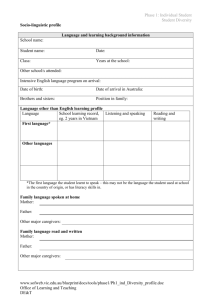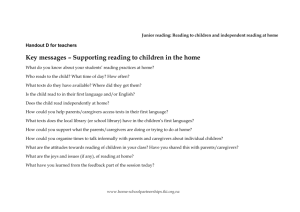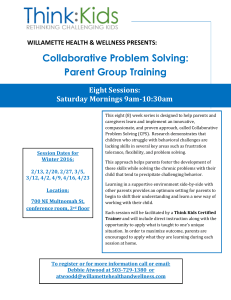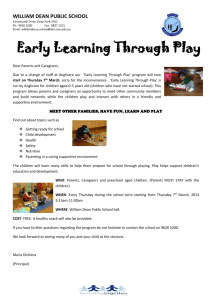Day Care - Indiana University
advertisement
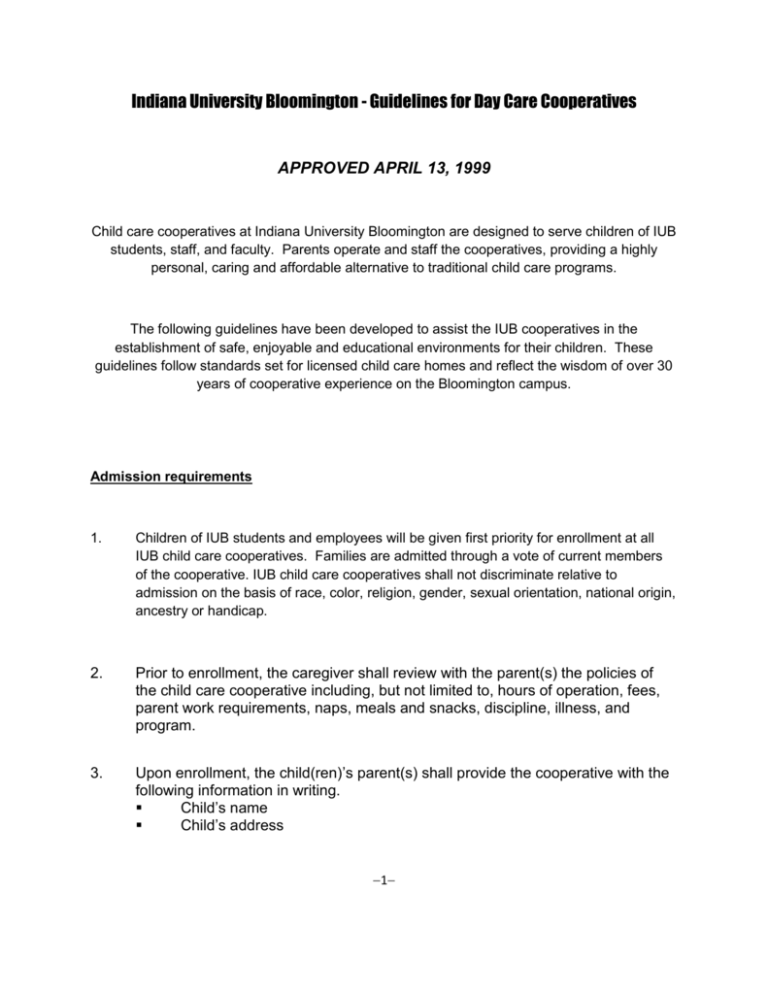
Indiana University Bloomington - Guidelines for Day Care Cooperatives APPROVED APRIL 13, 1999 Child care cooperatives at Indiana University Bloomington are designed to serve children of IUB students, staff, and faculty. Parents operate and staff the cooperatives, providing a highly personal, caring and affordable alternative to traditional child care programs. The following guidelines have been developed to assist the IUB cooperatives in the establishment of safe, enjoyable and educational environments for their children. These guidelines follow standards set for licensed child care homes and reflect the wisdom of over 30 years of cooperative experience on the Bloomington campus. Admission requirements 1. Children of IUB students and employees will be given first priority for enrollment at all IUB child care cooperatives. Families are admitted through a vote of current members of the cooperative. IUB child care cooperatives shall not discriminate relative to admission on the basis of race, color, religion, gender, sexual orientation, national origin, ancestry or handicap. 2. Prior to enrollment, the caregiver shall review with the parent(s) the policies of the child care cooperative including, but not limited to, hours of operation, fees, parent work requirements, naps, meals and snacks, discipline, illness, and program. 3. Upon enrollment, the child(ren)’s parent(s) shall provide the cooperative with the following information in writing. Child’s name Child’s address 1 4. Child’s gender Name and telephone number of the child’s parent(s) or legal guardian(s) Telephone number of a responsible adult, other than the parent, to contact in the case of an emergency Names of all adults who are authorized to pick up the child from day care An emergency medical release form signed by the parent(s) Within thirty (30) days of enrollment, the parents shall provide the cooperative a health form signed by a physician that documents: 6. that the child is free from any condition that would preclude participation in the cooperative up-to-date immunization record for the child any allergies or other chronic health conditions including, but not limited to, asthma, diabetes, and allergies Admission and retention decisions for children with physical, mental and/or emotional disabilities will be made on a case-by-case basis in accordance with the Americans with Disabilities Act. Maximum group size The maximum number of children cared for in an IUB parent cooperative shall be 18 children. Adult to child ratios 1. The following adult to child ratios shall be maintained. for groups of children between the ages of 6 to 18 months, the ratio shall be one (1) caregiver for every four (4) children (1:4). for groups of children between the ages of 18 months to 3 years, the ratio shall be one (1) caregiver for every five (5) children (1:5). for groups of children between the ages of 3 to 6 years, the ratio shall be one (1) caregiver for every six (6) children (1:6). in mixed age groups, the ratio shall be determined by age of the youngest child in the group 2 2. During waking hours, children will be directly supervised by caregivers at all times. During naptime, caregivers may be in adjacent rooms as long as baby monitors are used. 3. Only direct caregivers, including parents working their required shifts and work study employees, shall be included in adult to child ratios. Staff requirements 1. All caregivers shall be a minimum of 18 years of age. There shall be at least two (2) caregivers on site at all times, one of whom is a minimum of 21 years of age. 2. All caregivers shall provide written documentation from a physician indicating that they are free from any communicable disease or any other condition which would endanger the health or welfare of day care children or caregivers. 3. All caregivers shall have documentation of an initial and annual negative intradermal Tuberculin test. 4. All caregivers shall receive basic first aid training that includes emergency treatment in poisoning, seizures, hemorrhaging, choking, and CPR. 5. All caregivers shall receive initial and annual training in universal precautions. 6. All caregivers shall receive initial and annual training in child abuse and neglect reporting requirements. 3 General Requirements 1. The caregivers shall provide developmentally appropriate activities according to the ages, developmental needs, and interests of the children present. These activities shall include both active and quiet play. 2. The caregivers shall provide to the children a variety of sturdy, safe and nontoxic toys, games, and other play equipment fro the appropriate ages and number of children present. 3. Caregivers shall provide time each day for outdoor play except in the case of severe weather. 4. Parents shall be permitted to observe in the day care cooperative during normal operating hours. 5. Parents shall sign their child(ren) in upon arrival and sign them out upon leaving the child care cooperative. Each documentation of attendance shall include the time of arrival and departure and the signature or initials of the parent. These attendance records shall be kept on file for a minimum of three (3) months at the cooperative. Health 1. Children shall thoroughly wash their hands with soap and warm running water before meals and snacks and after using the toilet. Disposable paper towels shall be available to the children. 2. Caregivers shall thoroughly wash their hands with soap and warm running water before and after food service, before and after diapering or helping a child with toileting, before and after providing first aid, after using the toilet, or any other time that is necessary. 4 3. If a child becomes ill while at the cooperative, caregivers shall care for the child in a separate area from the other children and shall notify the child’s parent. 4. Caregivers shall follow the following procedures when dispensing medication to children. All medication, including over-the-counter medication, shall be administered only with prior written permission from the child’s parent or legal guardian. Prescription medication must be provided by the parent in its original container and must include the child’s name, physician’s name, the name of the pharmacy, and clear written instructions as to the dosage, time and reason that medication is to be given. Caregivers shall keep a written record of the date, time and dosage of any and all medication given. Napping 1. A period for rest or sleep shall be provided each day for children under the age of 6 years old. 2. A separate bed, cot, or mat shall be provided for each individual child. These shall be arranged head to toe and shall have at least one (1) foot between them. 3. Bed linens are to be used exclusively by one (1) child between washings. 4. Bed linens shall be washed at least once per week and changed immediately when soiled or wet. 5. Beds, cots, or mats shall be sanitized at least weekly with a bleach solution 5 comprised of one (1) teaspoon of bleach per gallon of water (or its equivalent). Beds, cots, or mats shall be sanitized immediately when soiled or wet. Sanitation 1. 2. Caregivers shall wash and sanitize daily all food preparation areas, serving areas, and utensils. A sanitizing solution of one (1) teaspoon of bleach per gallon of water (or its equivalent) shall be used on all food surface areas such as tables and counters. Caregivers shall keep garbage in containers with tight fitting lids and garbage shall be removed from inside the building daily. 3. There shall be at least one (1) toilet and one (1) sink accessible to the children. 4. Toys shall be sanitized at least weekly or more often as needed.. Safety 1. A working telephone shall be maintained in the cooperative at all times. 2. All exposed electrical outlets shall be covered with protective covers. 3. All poisonous or hazardous materials that would harm children including, but not limited to, cleaning supplies, detergents, insect sprays, and medications shall be stored in a locked area inaccessible to children. 4. If fans are used, caregivers shall provide models that are protected by safety devices which will not allow a child’s fingers to come in contact with the blade. 6 5. A copy of the Red Cross First Aid manual, or its equivalent, shall be kept on the premises. 6. A first aid kit , as recommended by the Red Cross or its equivalent, shall be maintained on the premises. 7. A written evacuation plan, in the case of fire or other emergencies, shall be posted in a conspicuous place. 8. Caregivers shall not block the exits from the cooperative. 9. The cooperative shall maintain in working order, fire safety equipment including: Smoke detectors An ABC multi-purpose fire extinguisher on each floor including an additional extinguisher in the kitchen. 10. Caregivers shall conduct and document quarterly fire drills. Fire drill records shall be kept on the premises. 11. The cooperative shall maintain a list of emergency telephone numbers including the police, fire department, poison control center, hospital, and ambulance service. This list shall be posted next to each telephone. The cooperative shall provide a safe, enclosed outdoor play area for the children. 12. Transportation 1. Day care children shall be transported only by an individual 18 years of age or older having a valid driver’s license and driving a properly licensed and insured car. 2. Day care children shall be transported in safety restraint equipment that is in compliance with Indiana statutes and regulations. 7 3. Children shall never be left unattended in a vehicle. 4. Caregivers shall obtain written parental permission before taking day care children away from the cooperative for field trips. Nutrition 1. Children shall be provided meals and snacks that meet their nutritional needs. 2. Children shall be served a minimum of one (1) meal and two (2) snacks per day. 3. Food shall never be used as a reward or punishment. 4. or Drinking water shall be made available to the children. Labeled individual cups disposable cups shall be used. Disposable cups are preferred by Public Health professionals. Discipline 1. Caregivers shall use discipline that is constructive in nature including, but not limited to, redirection, separation of the child from the problem situation, talking to the child, praising for appropriate behavior, or gentle physical restraint, such as holding. If a child is separated from a group situation, a caregiver must be available to supervise the child. A written discipline policy for the cooperative shall be distributed to each family upon enrollment. 2. Corporal or other cruel, harsh or unusual punishment of any form is prohibited. No child shall ever be shaken, hit, or spanked. 3. Discipline shall not be associated with food, rest or toilet learning. 8 Infant and Toddler Guidelines Activities and Equipment 2. After discussion with the parents, caregivers shall establish flexible routines for naps, feedings, and toilet learning that are consistent with the child’s routines whenever possible. 3. Caregivers shall allow infants and toddlers who are awake to be outside their cribs for activities. If an infant cannot yet move about the room, the caregiver shall periodically change the available toys and the position of the infant in the room. 4. All articles and toys which the infant is given to handle shall be nontoxic, washable, too large to be swallowed, and without rough edges or sharp corners. Toys shall be kept in a clean and safe condition and shall be sanitized at least weekly. Naps 1. Caregivers shall provide a separate, safe, sturdy crib, portacrib or playpen in which each infant can sleep. Each crib, portacrib or playpen shall be equipped with a firm-fitting mattress or pad made of waterproof materials. 2. Caregivers may use washable cots, sleeping bags or mats for toddlers. 3. Bed linens shall be washed weekly or immediately when soiled or wet. 9 Diaper changing and toilet learning 1. Caregivers shall provide an area for diaper changing with a washable surface on which the infant or toddler can be placed. Disposable towels or wipes shall be used for cleansing during diaper changing. Caregivers shall sanitize the diaper changing area after each use. 2. Caregivers shall provide a covered container for wet or soiled diapers. 3. Parents shall provide clean disposable or cloth diapers and a change of clothing. All items shall be labeled with the child’s name. 4. Caregivers shall wash their hands before and after each diaper change. 5. The infant or toddler’s hands shall be cleansed after diaper changing or toileting. 6. Caregivers shall undertake toilet learning: At a time mutually agreed upon with parents. In accordance with the child’s age and development. That is consistent with the child’s routine at home. Feeding 1. Caregivers shall feed infants and toddlers according to their dietary needs. 2. If more then one (1) infant or toddler is present in the cooperative, caregivers shall label feeding bottles and leftover food with the children’s names. 3. Caregivers shall not prop feeding bottles in the mouth of an infant or toddler at any time. 10 4. Caregivers shall assist infants during bottle feedings at least until they demonstrate the ability to hold their own bottle. 11 Documentation Requirements The cooperative shall maintain the following documents on the premises. 1. Enrollment form for each child which shall include the following: Child’s name Child’s date of birth Child’s gender Name, address and telephone number of each child’s parent or legal guardian. Telephone number of a responsible adult in case of emergency Names of adults that are authorized to pick up the child from the cooperative. 2. An Emergency Medical Treatment Release Form signed by the child’s parent or legal guardian for each enrolled child. 3. A health form signed by a physician for each enrolled child that documents: that the child is free from any medical condition that would preclude participation in the cooperative up to date immunization record for the child any allergies or other chronic health conditions including, but not limited to, asthma, diabetes, and allergies 4. Written parental permission for taking the child away from the coop for field trips. 5. Daily attendance records for each enrolled child. 6. A health form signed by a physician for each caregiver that documents: that the caregiver is free from any medical condition that would preclude participation in the cooperative an initial and annual negative Mantoux Tuberculin test 7. Documentation of initial and annual training for each caregiver in: First Aid 12 CPR Universal Precautions Child abuse and neglect reporting requirements 8. Record of dates of quarterly fire drills. 9. A written plan of evacuation for the cooperative in case of emergency. 13 10. Written statement of the cooperative’s discipline policy that is distributed to parents Compliance 1. Each cooperative shall designate a person or persons who will be responsible for the regular monitoring of compliance with these guidelines. 2. Each cooperative shall submit an annual report to the Campus Child Care Support office documenting their compliance with these guidelines. Questions regarding these guidelines should be directed to the Campus Child Care Support office 855-5053 14
